The India-Japan relationship is rooted in the long history of cultural and civilizational ties. The exchange between the two countries is said to be around in the 6th century when Buddhism was introduced in Japan. After World War II, India signed a peace treaty with Japan and established a diplomatic relationship on 28th April 1952. The year 2012 marked the 60th Anniversary of the Establishment of Diplomatic Relations between Japan and India. Various cultural events took place both in Japan and in India to promote mutual understanding between the two countries, under the theme of “Resurgent Japan, Vibrant India: New Perspectives, New Exchanges.”
During the visit of Prime Minister Modi to Japan in November 2016, the two Prime Ministers declared the year 2017 the Year of Japan-India Friendly Exchanges to further enhance people-to-people exchanges between Japan and India. The year 2017 also marked the 60th anniversary since the Cultural Agreement came into force in 1957.
Fumio Kishida has formally taken office as Japan’s new prime minister, succeeding Yoshihide Suga who resigned after just one year in office due to plummeting poll ratings caused by the handling of the pandemic. Fumio Kishida became the longest-serving post-war foreign minister, holding the post from 2012 to 2017. As he is a Hiroshima native, he opposes the use of the nuclear weapon. The major task for him at this point will include post-pandemic economic recovery and threats from North Korea.
As Kishida became the longest-serving foreign minister under Prime Minister Abe administration and was also the designer of Prime Minister Abe’s foreign and security policies, it is quite evident that the legacy of the previously good relations will continue under this ministership as well. It can be seen clearly from the previous policies and agreement of Japan that how the country views India as an essential partner that will determine the direction of Asia in the 21st century. India has always been considered important for Japan’s Indo-Pacific concept. Prime Minister has extended its support to Prime Minister Narendra Modi’s “Make in India” initiatives. He has further proposed to support and strengthen the “three bridges” on which the relationship between two countries was already based on name, value and spirit, vibrant economy and open and stable sea. Through enhances military and strategic cooperation, peace and stability in the region are to be maintained. He is also further committed to the working of organisations like ASEAN and SAARC and to help India develop the region of the north-east for better connectivity and cooperation among the two countries.









